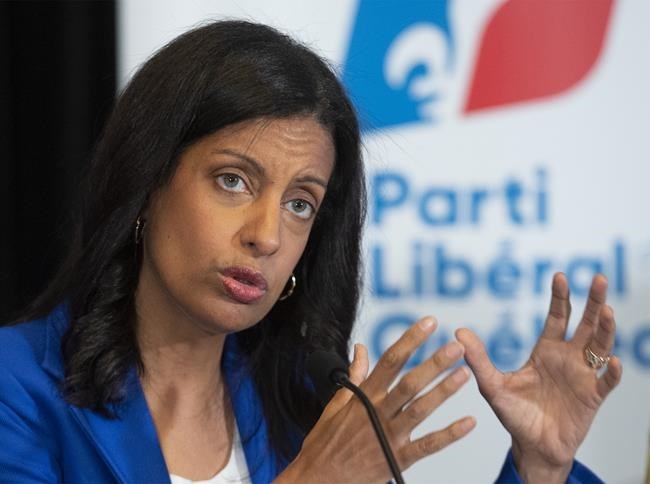MONTREAL — The Quebec Liberal Party on Sunday became the first political party of the current campaign to release a costed breakdown of its election promises, which includes $41 billion in spending over five years.
The party estimates the annual deficit would average about $5 billion, after mandatory contributions to a fund to reduce the province's debt.
The party projects the net debt would increase by a total of $5 billion over the forecasts reviewed by the auditor general in August, before the start of the election campaign.
Liberal Leader Dominique Anglade defended her party's plan as "equitable and responsible," noting that the province's overall debt burden would continue to decrease.
"We're not talking about huge deficits," she said.
The Liberals are counting on paying for their promises in part through an additional $10 billion in revenue. The party also predicts the revenue paid into the debt-reduction fund will continue to increase, as will revenue from taxes and other sources.
A pre-election financial report released by Quebec’s outgoing finance minister ahead of the election projected the province's projected deficit had shrunk by billions of dollars, thanks in large part to inflation.
The province's auditor general, who reviewed the report and found it plausible, credited increased tax revenue from salaries and sales tax for the improvement in the government's fortunes.
The most expensive promise in the Liberal platform is $12 billion for income tax cuts, followed by a $10-billion allowance to seniors.
Anglade said the party's platform includes measures to tackle the province's labour shortage, including incentives to keep older workers on the job.
The plan she released Sunday also takes into account measures to help Quebecers handle the increase in costs of living, she said.
"There are families that are struggling right now between paying rent, buying groceries, paying for activities for the children," she said. "People are really having a hard time making ends meet."
The Liberals are counting on increasing revenue through tackling undeclared work and tax havens — although she did not explain how her party would succeed in doing the latter when so many other politicians have failed.
"It takes political will, which we have," said Fred Beauchemin, one of the party's candidates.
The party also plans to bring in several new taxes, including a wealth tax, a tax on vacant buildings and another on web giants.
Anglade said the promises would be achieved without cutting services, an attempt to distance herself from the last Liberal government led by Philippe Couillard, which brought in unpopular austerity measures to balance the budget.
The Liberal plan was denounced by Coalition Avenir Québec Leader François Legault, who accused his rival of irresponsible spending.
"It's not pretty, I think the Liberals have just disqualified themselves," he said in Laval.
Most of Quebec's party leaders spent Sunday in the Greater Montreal Area as the provincial election campaign entered its second week.
Legault began his day in a Liberal-held riding in Laval, where he continued his string of health-care promises with a commitment to implement home hospitalization services if re-elected.
Legault said Sunday that hundreds of hospitalized patients each year could be transferred home, where they could continue to be followed through a combination of telemedicine and in-person visits from health workers.
He told reporters the service could be rolled out beginning in late 2023 to patients who agree and who meet strict criteria, including living within a certain distance of a hospital and having help from a caretaker.
Québec solidaire unveiled its environmental platform, including a plan to cut greenhouse gas emissions by 55 per cent over 1990 levels by 2030.
The left-wing party's environmental platform also includes a law that would force the government to meet its climate goals in the medium term, intercity train and bus services and a ban on gas-powered vehicles by 2030.
The Parti Québécois, meanwhile, focused on labour issues, including a promise to gradually raise the province's minimum wage to $18 an hour.
Later Sunday, all the main party leaders were set to appear on Radio-Canada for a series of individual interviews.
This report by The Canadian Press was first published Sept. 4, 2022.
With files from Patrice Bergeron, Caroline Plante, Stéphane Rolland and Frederic Lacroix-Couture
Morgan Lowrie, The Canadian Press




